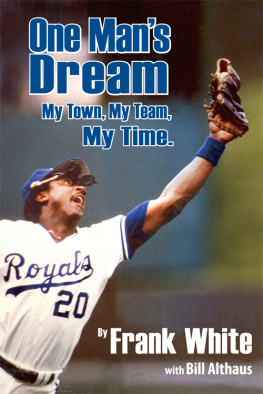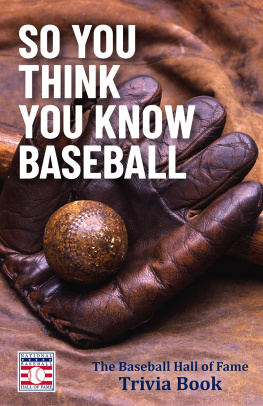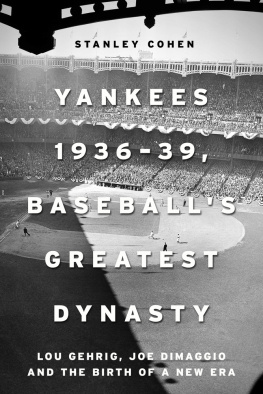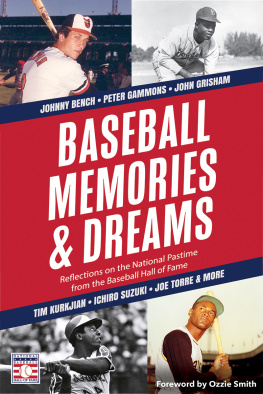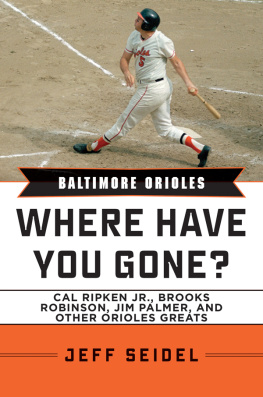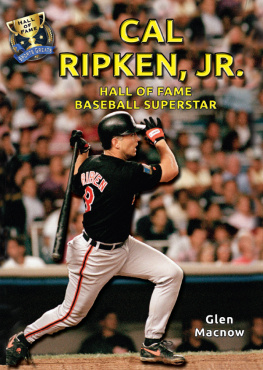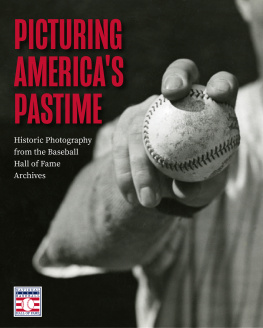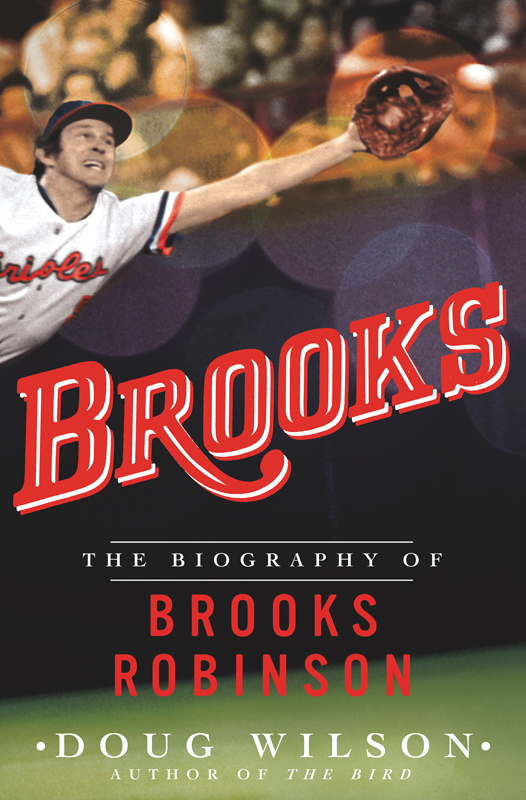
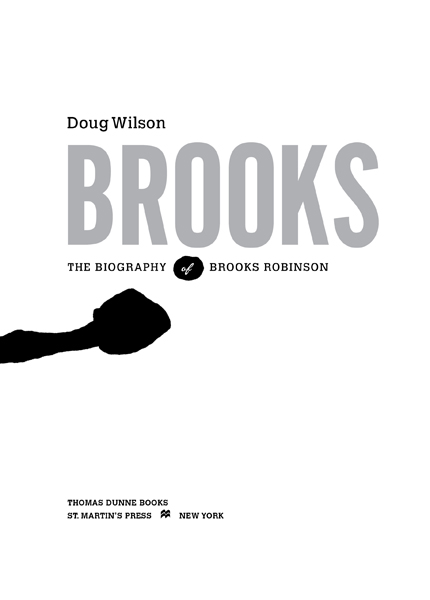
The author and publisher have provided this e-book to you for your personal use only. You may not make this e-book publicly available in any way. Copyright infringement is against the law. If you believe the copy of this e-book you are reading infringes on the authors copyright, please notify the publisher at:
us.macmillanusa.com/piracy .
Contents
Preface
THERE ARE A FEW PLAYERS in each sport whose deeds and aura were so pervasive that they defined the era in which they played. For me, Brooks Robinson was one of those players. He was a ubiquitous presence in the baseball of my youth, leaving an indelible impression on both All-Star Games and the postseason. His 23-year career spanned an epic period of change in baseball. It started in the mid-1950s, a time of sporadic black-and-white televised games and daytime World Series; a time when a prospect could sign with any team, outrageous bonuses were considered to be $4,000, and players were bound for life to the team that signed them. It lasted through the mid-1970s with the dawning of the Players Association, the fight for free agency, exploding television rights, agents, and big money. He not only was there, but more often than not played an important role in shaping the way the game was played and presented to the public.
Yet very little has been written about Brooks Robinson in the past 30 years and his life has never had the full-length, comprehensive biography treatment. I believe the reason for this is that there was a notable lack of conflict or controversy. There were no tragic humiliations; no arrests, no public brawls with spouses, no hints of cheating, substance abuse, or scandal. In other words, none of the things that drive book sales. He was unquestionably viewed as a squeaky-clean good guy in a time when attitudes were changing and other attributes were more celebrated, and consequently, his character was taken for granted. It is precisely for these qualities that I decided to pursue this book, however. Brooks exhibited many of the values that we now regret as lost. As time has gone by, his public persona stands as the role model we would want for our children. The present generation of fans is constantly reminded of the failings of its heroes. Much is written about how we are let down by cheaters and liars, by overpaid bores with little regard for their fans. This makes a man of Brooks Robinsons reputation even more important to revisit.
I should state at this point that I was never a particular fan of Brooks Robinsons while growing up. My heart belonged to Harmon Killebrew and the Twins and later, after my family moved, to the Big Red Machine of Cincinnati. The fact that Brooks seemed to enjoy inflicting postseason pain and misery on both of my teams did not make me dislike him, however. He played with a style and a flair that were impossible not to appreciate. I invariably found myself in the yard throwing a rubber ball against the side of the garage in such a way that I would be forced to dive to catch it, attempting to replicate his plays, although admittedly more than a few redos were required.
* * *
I communicated with Brooks Robinson, out of courtesy, to let him know of my intentions, but he was not involved in this project in any way. This was by design. I had previously learned that he had been battling serious medical problems which had forced him to curtail public appearances and he had turned down several book offers due to time constraints. He obviously needed to spend more time with his family.
More importantly, I feel that an inherent weakness of authorized biographies is that the subject has ultimate editorial control. Therefore, the author may not be able to critically evaluate sensitive topics. In choosing this subject, I knew that much of the material would be flattering. I did not want there to be a perception that I was influenced or felt a debt. I wanted the reader to be sure that the facts were presented based on research and interviews.
In my search for the Brooks Robinson story, I talked to people from all aspects of his life. I visited Little Rock to view Brooks Robinsons childhood homes, schools, playing fields, and even the firehouse in which his father worked. I listened as a group of his childhood friends traded stories. I talked to teammates, managers, and opponents from throughout his career, as well as those peripheral to the game. I talked to fans who met him as a player and those who met him in his later years. I talked to a scout and a newspaper reporter who witnessed his first workout with the Baltimore Orioles. I sifted through a mountain of microfilm and a gaggle of Google News Archives articles in addition to searching through old editions of the Sporting News , Sport , Baseball Digest , and Sports Illustrated to fact-check numbers and accounts of events as well as to find out what his contemporaries said about him.
Over the years, Brooks freely gave information about his life to numerous articles and book chapters, and wrote two autobiographical works. Putting It All Together , published in 1971, focused mostly on the 1970 World Series but also included anecdotes from his life. Third Base Is My Home , published in 1974, was more comprehensive. This book will fill in the gaps and will cover his entire career along with his post-baseball life. Also, a large part of the present book will deal with Brooks Robinsons character and treatment of fanssubjects that are impossible for a man to objectively write about himself.
I did not set out to blindly apply another coat of polish to the statue of a legend. In a closing scene of the classic western The Man Who Shot Liberty Valance , the reporter states, When the legend becomes fact, print the legend. It was my intention to do just the opposite; I wanted to find out if the legend was indeed fact, and print whatever I found. If after reviewing the results of the research, another coat of polish is applied, then so be it.
Prologue
IT WAS JUST A MATTER OF TIME before the Big Red Machine started rolling. Going into the bottom of the sixth inning of the first game of the 1970 World Series, the powerful Reds were tied with the Baltimore Orioles, 33. Lee May, the Cincinnati first baseman, took his place in the right-handed batters box. A strapping man known as a dead pull hitter, May had hit 72 home runs in the past two seasons. He focused intently on the pitcher, Jim Palmer, and paid no attention to the man standing roughly 100 feet to his left. That man, Baltimore third baseman Brooks Robinson, was studying him closely, however. A 33-year-old veteran with droopy shoulders, a doughy body, and a rapidly receding hairline, Robinson did not look like a professional athlete when seen out of uniform; but looks could be deceiving.
Robinson held his hands close together in front of his chest and crouched, not unlike a cat before pouncing on a mouse. On his left hand he wore an ordinary-looking piece of leather that held the words Rawlings Pro Model. The glove was stained brown, stiff and cracked. The fur under the wrist strap was worn and frayed. A small piece of tape bearing Robinsons name covered the name of the gloves original owner, a young Oriole outfielder from whom he had obtained it in a trade a few years earlier because he liked the way it felt. This glove was not the only glove Robinson possessed. He had two other gloves in his locker that he used during pregame practice to break in for future use. He also had some gold ones at homehe had been the winner of the past 10 Gold Gloves for American League third basemen. Brooks Robinson had been one of the best players in baseball over the previous decade and was appearing in his third World Series in five years, but in the days before daily television highlights, he was still underappreciated by casual fans outside Baltimore. That was about to change. As Palmer went into his long-armed windup, Robinson did not realize that the next pitch would be the start of a series of events over the next five days that would ensure that the unappealing piece of leather on his hand would wind up in the Baseball Hall of Fame a good 10 years before its owner would.



